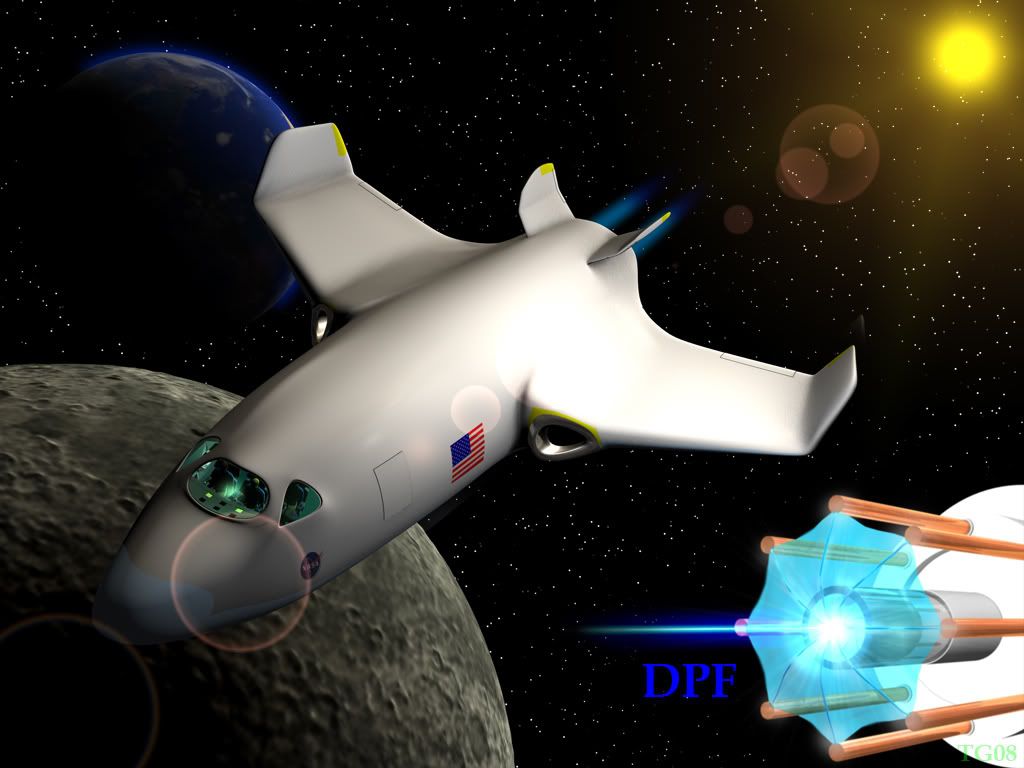Fusion propulsion papers - ZaP and STX
Posted: Mon Oct 12, 2009 6:44 pm
a discussion forum for Polywell fusion
https://talk-polywell.org/bb/

Abstract: The objective of this study was to perform a parametric evaluation of the performance and interface characteristics of a dense plasma focus (DPF) fusion system in support of a USAF advanced military aerospace vehicle concept study. This vehicle is an aerospace plane that combines clean "aneutronic" dense plasma focus (DPF) fusion power and propulsion technology, with advanced "waverider"-like airframe configurations utilizing air-breathing MHD propulsion and power technology within a reusable single-stage-to-orbit vehicle. The applied approach was to evaluate the fusion system details (geometry, power, T/W, system mass, etc.) of a baseline p-11B DPF propulsion device with Q = 3.0 and thruster efficiency, eta prop = 90% for a range of thrust, Isp and capacitor specific energy values. The baseline details were then kept constant and the values of Q and eta prop were varied to evaluate excess power generation for communication systems, pulsed-train plasmoid weapons, ultrahigh-power lasers, shielding/cloaking devices and gravity or time-distorting devices. Thrust values were varied between 100 kN and 1,000 kN with Isp of 1,500 s and 2,000 s, while capacitor specific energy was varied from 1 - 15 kJ/kg. Q was varied from 3.0 to 6.0, resulting in gigawatts of excess power. Thruster efficiency was varied from 0.9 to 1.0, resulting in hundreds of megawatts of excess power. Resulting system masses were on the order of 10's to 100's of metric tons with thrust-to-weight ratios ranging from 2.1 to 44.1, depending on capacitor specific energy. Such a high thrust/high Isp system with a high power generation capability would allow military versatility in sub-orbital space, as early as 2025, and beyond as early as 2050. This paper presents only the views and recommendations of the authors themselves and are not necessarily those of the Air Force.
Pushing forward. Here are the new news feeds and images of the research rig just completed:kurt9 wrote:I know we've had this discussion else where. However, focus fusion is much more speculative than IEC polywell or John Slough's FRC concepts.
Does the Air Force know something we don't?...excess power generation for communication systems, pulsed-train plasmoid weapons, ultrahigh-power lasers, shielding/cloaking devices and gravity or time-distorting devices.
Sorry for my skepticism. I guess I will not believe it until they make it.Brian H wrote:Pushing forward. Here are the new news feeds and images of the research rig just completed:kurt9 wrote:I know we've had this discussion else where. However, focus fusion is much more speculative than IEC polywell or John Slough's FRC concepts.
http://focusfusion.org/index.php/site/a ... yesterday/
http://focusfusion.org/index.php/gallery/image_med/58/ & ff & prev.